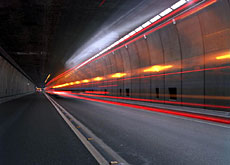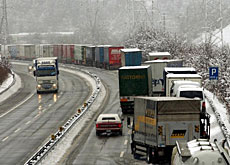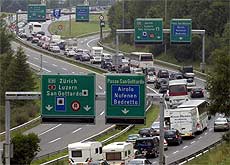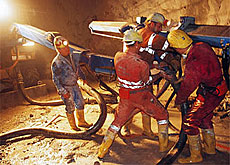Government grudgingly backs road transport vote

The Swiss cabinet is backing proposals to ease traffic congestion by upgrading the country’s main roads and investing in public transport.
Opponents argue a “yes” in February’s nationwide vote would be disastrous for the environment.
The transport minister, Moritz Leuenberger, has half-heartedly approved the proposals.
But he has also made it clear that they are not exactly what the government put forward in the first place.
“Those proposals said that certain hotspots around cities should be relieved by improving roads, but they also stressed that the second road tunnel through the Gotthard should not be built,” he told a news conference.
“Parliament created something different out of the government’s proposals with the second tunnel and funds for roads in built-up areas.”
Investment
The government plan is a counter-proposal to the so-called Avanti initiative, which was launched in 2000 and later withdrawn.
The plan calls for SFr300-350 million of public money to be set aside annually to tackle the problem of traffic congestion in and around major towns and cities.
The money would not just be used for building new roads, which the government says alone will not solve the problem.
It would also be invested in improving public transport, including tram, bus and rail networks.
Gotthard
Although the proposals do not commit the government to a timetable or constitute a firm commitment to building a second road tunnel through the Gotthard, they lay the constitutional foundations for its construction.
There are currently two tunnels through the Gotthard – Switzerland’s main north-south axis through the Alps – one road and one rail.
A second rail tunnel is being built and is scheduled for completion by 2014.
Opponents have seized upon the possibility of a second road tunnel to fuel their campaign.
They argue that it is unnecessary and potentially damaging to the environment, and flouts Switzerland’s policy of protecting the Alps.
“A decade ago the Swiss voted in favour of a transport policy that would take freight off the roads and put it on the railways,” Adrian Schmid of the Swiss Association for Transport and the Environment told swissinfo.
“The new government proposals would mean a relaxation of that policy and lead to increased pollution levels either side of the Gotthard.”
Cuts
For Leuenberger the most important aspect is that the proposals would ease traffic congestion in built-up areas.
He warns that they are the only way of securing state funding at a time when the government is making cutbacks in all areas of public spending.
Last year alone parliament agreed to cuts of around SFr300 million in funds made available for improvements in public transport.
And Leuenberger says further cuts could be in the pipeline.
“The government is currently putting together proposals for more budget cuts this year,” he said.
“As far as I’m concerned the pain threshold in public transport was reached a long time ago, but I cannot rule out further spending cuts being made to public transport,” he added.
Costs
It is also the fear of further budget cuts that concerns Schmid – although for different reasons.
He argues that extra money should not be invested in Switzerland’s road network at a time when vital public services such as health and education are not protected from spending cuts.
“The problem with these proposals is that they simply cost too much,” he said.
“They come at a time when the country is trying to save money, and they make no promise as to just how much of the money would be spent on public transport and how much would go into building new roads,” he added.
Close call
The vote on February 8 is expected to be a close one. Public opinion is split, as are Switzerland’s four main political parties.
The centre-right Radicals and the rightwing Swiss People’s Party are both recommending a “yes” vote.
The centre-right Christian Democrats and the centre-left Social Democrats are urging voters to say “no”.
swissinfo, Jonathan Summerton
The government argues that the volume of traffic on Swiss roads is set to increase by 15-30% by 2020.
The proposals entail a change to the constitution, and will require a majority of both the popular vote and cantons to become law.
The proposals envisage creating a new fund to set aside an initial SFr1.6 billion for improving the road network and public transport.
Opponents claim the total cost of the proposals could be as much as SFr105 billion.
In 1994, the Swiss voted to ban the construction of major new roads in the Alps and to transfer transalpine freight from road to rail.

In compliance with the JTI standards
More: SWI swissinfo.ch certified by the Journalism Trust Initiative



You can find an overview of ongoing debates with our journalists here. Please join us!
If you want to start a conversation about a topic raised in this article or want to report factual errors, email us at english@swissinfo.ch.